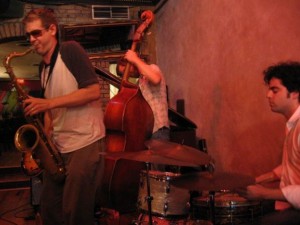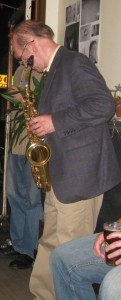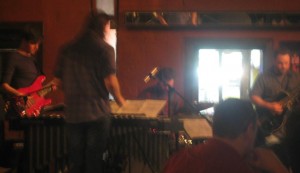Recently, I found myself in a dull part of Pittsburgh, looking for a place just to get off the street, relax, and have a drink with a friend. The only place we could find promised live music–a bonus, from my point of view, since witnessing live music is one of the most rewarding experiences I know of. Unfortunately, what the sign really meant was that a very loud P.A. was blasting the sound of a guy strumming (loudly) a few chords on guitar and singing some party tune. No doubt in some logical sense that can be described as “live music,” but there’s no real connection there with music as I understand that term. I had to leave.
On the other hand, though, I was recently walking down a street in Philadelphia when suddenly I heard a swing rhythm on a ride cymbal, cycle of fifths harmony with a walking bass line and a piano playing thirds and sevenths, and eighth-note lines on a trumpet. I can’t hear that without feeling an immediate magnetic pull on my soul–I had to go in.
 Why is it that jazz music has always captivated me? I think there are probably two reasons.
Why is it that jazz music has always captivated me? I think there are probably two reasons.
The first reason I find jazz so appealing is that the ability to play it only comes with quite a deep involvement in music, and this, it seems to me, is audible in the music: though jazz music can often be immediately gripping melodically, rhythmically or atmospherically, it is also immediately clear that its complex–a feature that people often respond to by saying “I don’t get it,” or “that sounds difficult.” Jazz is not the kind of music that anyone can just pick up and play and, for better or for worse, that feature of the music is part of its sound. What I like about this is not the sound of “elitism,” not the “cerebral” character, but the sound of music as such being appreciated: I think that jazz music “says,” so to speak, “appreciate music,” and for that reason jazz music cannot truly be listened to if one does not in listening feel compelled to reflect, through its richness, on the nature of music itself.
The second reason I find jazz so appealing is that it is inherently improvisational, which means that music as a process, not just music as a result, is what is being enacted. A jazz performance is truly “live” in that the music itself is being brought to life uniquely in that performance. Jazz music is performative, uniquely brought into being in its being performed.
These two definitive features of jazz music that I have identified here, however, exist in tension with my initial description of the music that drew me into the bar in Philadelphia. Jazz, I am saying, is improvisational, exploring in its music the very nature of music. For that reason, jazz can never take a single definitive form, but will necessarily exist as a “permanent revolution,” always transforming its nature through its practice. But if jazz, therefore, is not the perpetual reenactment of an established form, it cannot be simply identified with a walking bass line or a “Charleston” rhythm: jazz certainly took that form, but that form is not identical to jazz.
I love jazz music, and that means for me that I love Louis Armstrong and the Hot Fives, I love Duke Ellington, Charlie Parker and Red Norvo, I love Sonny Rollins, Mal Waldron, and Jackie Byard, I love Elvin Jones, Wayne Shorter, Billy Higgins, etc. etc. But what is it I love about them? I love the fact that through their performances, (of which I have only that aspect which is the recorded sound, not their bodily creation, in the lived time of a performance, of a musical interaction with the other musicians), through what they play, I can hear “jazz”: jazz is not the specific form (which can be repeated endlessly by students who can learn the techniques without necessarily experiencing the music) but what is heard through the form. I love these performers not because I think their specific way was the right way, but because each in his own specific way was bringing into being the tradition of jazz, that is, they were the changing way through which jazz performed itself.
 I therefore think that, in a distinctive way, jazz is a “traditional” art form–traditional, not in the sense of being part of the tradition our culture carries on, but in the sense that it can only exist as a tradition, for there is no definitive form in which it can be realized: jazz only exists as a tradition of changing forms.
I therefore think that, in a distinctive way, jazz is a “traditional” art form–traditional, not in the sense of being part of the tradition our culture carries on, but in the sense that it can only exist as a tradition, for there is no definitive form in which it can be realized: jazz only exists as a tradition of changing forms.
Are those old, “traditional” forms still jazz? If those old forms are simply reenacted religiously, then I don’t think they are jazz–they may be objects of sentimental affection for some, but as music they will be dull and past. If those old forms are reenacted musically, however, then they remain open avenues for musical exploration: the reasons they could be vehicles for jazz once remain alive, and they can be vehicles for jazz again.
 Jazz will not only be found in the vibrant reenactment of these established forms, however, but will more especially be found in the new musical forms that are being developed by musicians pushing themselves over the horizons of the tradition. Those who inherit the tradition of jazz will carry on its spirit not through a reverential repetition of that tradition but through a creative, performative engagement with the spirit of improvisation, “respecting their elders” by demonstrating the same bold innovative spirit that made Duke, Bird, Mingus and Monk great in the first place.
Jazz will not only be found in the vibrant reenactment of these established forms, however, but will more especially be found in the new musical forms that are being developed by musicians pushing themselves over the horizons of the tradition. Those who inherit the tradition of jazz will carry on its spirit not through a reverential repetition of that tradition but through a creative, performative engagement with the spirit of improvisation, “respecting their elders” by demonstrating the same bold innovative spirit that made Duke, Bird, Mingus and Monk great in the first place.


 Participants in these
seminars consistently have the experience of growth in their conversation and
conceptual abilities, and typically leave with a transformed sense of the nature
and possibilities of philosophy.
Participants in these
seminars consistently have the experience of growth in their conversation and
conceptual abilities, and typically leave with a transformed sense of the nature
and possibilities of philosophy.





3 Comments
In part because I’m currently reading your book _Bearing Witness to Epiphany_, I thought a lot while reading this post how meaningful these ideas would be if one replaced “jazz” with “living.” I especially thought about how it is often the case that people (including me) can get to points where it seems difficult to improvise or creatively enact the performance of life. Sometimes, we might just feel like saying “I don’t like this” like someone might say “I don’t like jazz.” If we do, however, take up life and all of its situations–the stressful, difficult, or mundane ones as well as the “fun” ones–as something to which we need to respond creatively, it seems as though we’re actually doing the thing called for by human existence…in a way that your discussion of jazz suggests it does what is called for by music. I also note that just as a jazz solo can succeed or fall flat, work well with its accompaniment or clash with it, our attempts at taking up life and its demands can do the same. In both cases, it is important, it seems, to keep moving, keep trying, and keep listening above all.
Here is a quote that I find relevant to the ideas you are discussing. It comes from Paul-Emile Borduas, the French-Canadian painter:
“A magnificent duty falls on us: history elects us to preserve the precious treasure it bequeaths.
“Real things require relationships repeatedly renewed, or challenged, or put to question: relationships impalpable, exacting and dependent on the vivifying force of action.
“Our treasure is poetic resource: the emotional wealth on which the centuries to come will draw. It cannot be passed on unless it is transformed, and lacking this it is deformed.”
These comments by Luis and Kirsten seem closely related. Our existence is presented to us as a mystery–but a demanding mystery. We are confronted with the urgency to respond, without possessing the knowledge of how properly to respond. What we do have are the traditions of human grappling with this very challenge, and these efforts of the past are great and inspirational resources for us. Simply to reiterate past accomplishments, however, is not truly to respond but to live in denial of the need to respond. We preserve the past in its true importance and worth when we take it up creatively–improvisationally–to forge a unique and original response to our own situation.